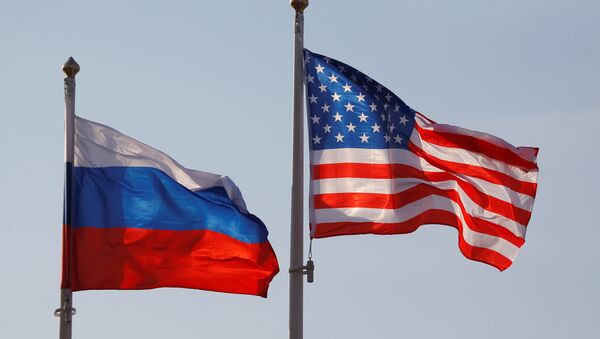Sputnik interviewed one of the panelists — President of the American Chamber of Commerce in Russia Alexis Rodzianko.
Sputnik: How long do you think it's going to take to move the Russia-US relationship away from the freezing point, and what would it take from both sides?
Rodzianko: Well, first of all let's stop on the business relationship, and the business relationship goes on and the business relationship continues to be quite good and constructive. Given the political relationship which is difficult, business successes in Russia generally don't find their way to the front page. Companies do their business very quietly and continue to do their business.
READ MORE: Germans, French Oppose US Sanctions Against EU Gas Projects With Russia — Poll
In terms of what it will take to improve the political side of the relationship — well, I don't see an easy solution, because fundamentally Russia views Ukraine pretty much the way the US views Canada. And, by analogy, if China organized a coup, and did a military agreement with Canada, the US would not sit by and watch it calmly. And that's essentially Russia's position. And the US position is very different — "what's your problem? Ukraine has its rights, leave them alone." And because these two positions are so far apart, and they haven't moved an inch, ultimately that's what it will have to be. I think it will be probably Ukraine who makes the decision about what's best for their future. And at some point that may be the solution to the problem.
Russia House in Davos is hosting a panel meeting on Russia-US relations. Improving business ties high on the agenda. pic.twitter.com/hABDJkmGr6
— Denis Bolotsky (@BolotskySputnik) January 25, 2018
And then, on the sanctions side — with the US law on CAATSA, sanctions are now for the first time in US-Russia history out of the hands of the executive branch. So, the executive branch is not fully in control of how to manage those sanctions.
READ MORE: US-Russia Lost Trade Opportunities
And, if history is a guide, those laws are very difficult to change. So, to me it's just a constant in the relationship, that we have to work with and around in order to continue to do business. Now, there are other sides of the relationship, and I've heard it from US officials that they are quite pleased with, I wouldn't say satisfied, but I think they're impressed by the quality of military communication in Syria, I think they see the possibilities and have already worked together on the issue of North Korean nuclear weapons — both sides have similar interests. So, there are areas that are positive, and there are areas that are difficult, but I think the difficult ones are very hard for me to see how they can be changed quickly.
Sputnik: Isn't Trump's "America first" strategy aligned to some degree with Barack Obama's sanctions policy when it comes to isolationism and protectionism, since both serve America's economic interests?
Sputnik: The Jackson-Vanik amendment to the Trade Act of 1974 has been around for decades, affecting trade between the Soviet Union/Russia and the US. In your opinion, how long may it take before current trade restrictions could be reconsidered?
Rodzianko: I have to think that it would be very difficult for the US congress to repeal this law. I don't imagine that happening any time soon — in what's left of my generation for sure. But I think the lifting of sanctions is a possibility after the Trump-Russia investigation is finished and if, and when there is progress on the Ukraine-Russia relationship and the Ukraine-US-Russia relationship, and I think that the key to that is actually in Kiev.
The views and opinions expressed this article are those of the speaker and do not necessarily reflect those of Sputnik.



